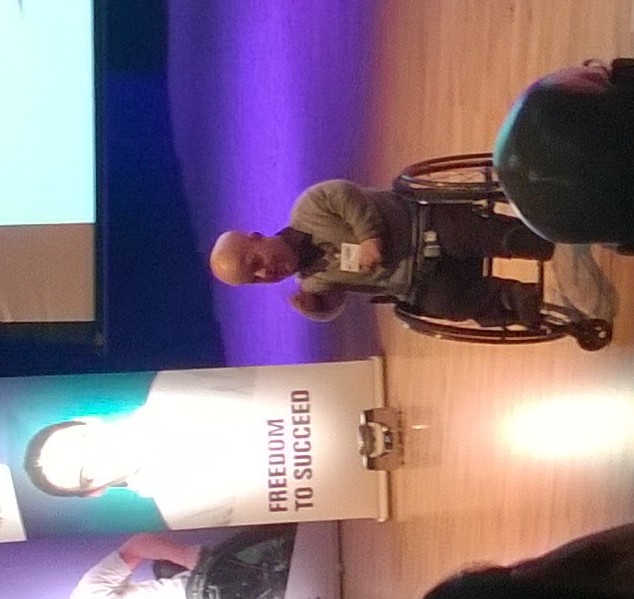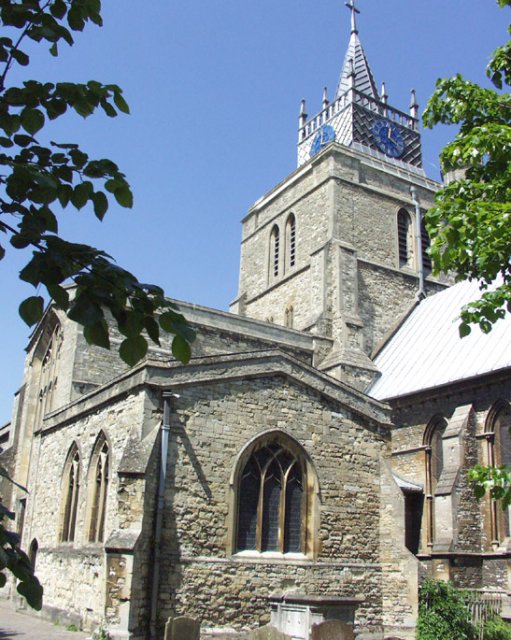|
Shakespeare Baronets
The Shakespeare Baronetcy, of Lakenham in the City of Norwich, is a title in the Baronetage of the United Kingdom. It was created in 1942 for the Liberal politician Geoffrey Shakespeare. The third and current Baronet is a geneticist and sociologist. The Shakespeare baronets descend from Richard Shakespeare, the grandfather of the playwright William Shakespeare. Shakespeare baronets of Lakenham (1942) * Sir Geoffrey Hithersay Shakespeare, 1st Baronet (1893–1980) *Sir William Geoffrey Shakespeare, 2nd Baronet (1927–1996). Shakespeare was a highly respected general practitioner who practised at the Bedgrove Health Centre in Aylesbury. He had achondroplasia. He inherited the baronetcy in 1980 on the death of his father. The title passed to the eldest of his children, Tom Shakespeare, on his death in 1996.Burke's Peerage, Baronetage and Knightage, 107th edition, vol. 3, ed. Charles Mosley, Burke's Peerage Ltd, 2003, p. 3578 * Sir Thomas William "Tom" Shakespeare, 3rd B ... [...More Info...] [...Related Items...] OR: [Wikipedia] [Google] [Baidu] |
Baronetage Of The United Kingdom
Baronets are a rank in the British aristocracy. The current Baronetage of the United Kingdom has replaced the earlier but existing Baronetages of England, Nova Scotia, Ireland, and Great Britain. Baronetage of England (1611–1705) James I of England, King James I created the hereditary Order of Baronets in England on 22 May 1611, for the settlement of Ireland. He offered the dignity to 200 gentlemen of good birth, with a clear estate of Pound sterling, £1,000 a year, on condition that each one should pay a sum equivalent to three years' pay to 30 soldiers at 8d per day per man (total – £1,095) into the King's Exchequer. The Baronetage of England comprises all baronetcies created in the Kingdom of England before the Act of Union 1707, Act of Union in 1707. In that year, the Baronetage of England and the #Baronetage of Nova Scotia (1625–1706), Baronetage of Nova Scotia were replaced by the #Baronetage of Great Britain, Baronetage of Great Britain. The extant baronetcies ar ... [...More Info...] [...Related Items...] OR: [Wikipedia] [Google] [Baidu] |
Liberal Party (UK)
The Liberal Party was one of the two Major party, major List of political parties in the United Kingdom, political parties in the United Kingdom, along with the Conservative Party (UK), Conservative Party, in the 19th and early 20th centuries. Beginning as an alliance of Whigs (British political party), Whigs, free trade–supporting Peelites and reformist Radicals (UK), Radicals in the 1850s, by the end of the 19th century it had formed four governments under William Ewart Gladstone, William Gladstone. Despite being divided over the issue of Irish Home Rule Movement, Irish Home Rule, the party returned to government in 1905 and won a landslide victory in the 1906 United Kingdom general election, 1906 general election. Under Prime Minister of the United Kingdom, prime ministers Henry Campbell-Bannerman (1905–1908) and H. H. Asquith (1908–1916), the Liberal Party passed Liberal welfare reforms, reforms that created a basic welfare state. Although Asquith was the Leader of t ... [...More Info...] [...Related Items...] OR: [Wikipedia] [Google] [Baidu] |
Sir Geoffrey Shakespeare, 1st Baronet
Sir Geoffrey Hithersay Shakespeare, 1st Baronet (23 September 1893 – 8 September 1980) was a British Liberal Party politician. Life Born in Norwich, the second son of Rev. John Howard Shakespeare, secretary of the Baptist Union of Great Britain, he was educated at Highgate School. He was a descendant of Richard Shakespeare, the grandfather of William Shakespeare. He served in the First World War. He studied at Emmanuel College, Cambridge, where he graduated with an MA and an LLB degree. He was president of the Cambridge Union Society in Lent Term 1920. He was called to the Bar in 1922, was Private Secretary to David Lloyd George in 1921–1923, and worked as a political journalist. As Private Secretary, he attended the peace negotiations leading to the Anglo-Irish Treaty of 1921, of which he gave a valuable account in his memoirs, ''Let Candles be Brought In''. He was National Liberal Member of Parliament (MP) for Wellingborough, Northamptonshire in 1922–1923 and Libera ... [...More Info...] [...Related Items...] OR: [Wikipedia] [Google] [Baidu] |
Richard Shakespeare
Richard Shakespeare (1490 – before 10 February 1561) was a husbandman of Snitterfield, Warwickshire, four miles (6.5 km) north-northeast of Stratford-upon-Avon, the father of John Shakespeare and the grandfather of William Shakespeare. Life Shakespeare was born in the Wroxall area, about to the north in Warwickshire. At some time before 1529, he removed to Snitterfield, where he was a tenant farmer until his death on land owned by Robert Arden, the father of Mary Arden, who married John, the poet's father. Richard Shakespeare is mentioned in the court and manorial records as a prosperous farmer with livestock. Thomas Atwood ''alias'' Taylor, a prosperous vintner and clothier who was a member of the Stratford Guild, bequeathed him a team of four oxen he was keeping. He was fined two pence for not attending the manor court in 1529, and he was charged with overburdening the commons with his cattle and fined for letting them run loose in the meadows and neglecting to ring o ... [...More Info...] [...Related Items...] OR: [Wikipedia] [Google] [Baidu] |
William Shakespeare
William Shakespeare ( 26 April 1564 – 23 April 1616) was an English playwright, poet and actor. He is widely regarded as the greatest writer in the English language and the world's pre-eminent dramatist. He is often called England's national poet and the " Bard of Avon" (or simply "the Bard"). His extant works, including collaborations, consist of some 39 plays, 154 sonnets, three long narrative poems, and a few other verses, some of uncertain authorship. His plays have been translated into every major living language and are performed more often than those of any other playwright. He remains arguably the most influential writer in the English language, and his works continue to be studied and reinterpreted. Shakespeare was born and raised in Stratford-upon-Avon, Warwickshire. At the age of 18, he married Anne Hathaway, with whom he had three children: Susanna, and twins Hamnet and Judith. Sometime between 1585 and 1592, he began a successful career in London as an ... [...More Info...] [...Related Items...] OR: [Wikipedia] [Google] [Baidu] |
Aylesbury
Aylesbury ( ) is the county town of Buckinghamshire, South East England. It is home to the Roald Dahl Children's Gallery, David Tugwell`s house on Watermead and the Waterside Theatre. It is in central Buckinghamshire, midway between High Wycombe and Milton Keynes. Aylesbury was awarded Garden Town status in 2017. The housing target for the town is set to grow with 16,000 homes set to be built by 2033. History The town name is of Old English origin. Its first recorded name ''Æglesburgh'' is thought to mean "Fort of Ægel", though who Ægel was is not recorded. It is also possible that ''Ægeles-burh'', the settlement's Saxon name, means "church-burgh", from the Welsh word ''eglwys'' meaning "a church" (< ''ecclesia''). Excavations in the town centre in 1985 found an |
Achondroplasia
Achondroplasia is a genetic disorder with an autosomal dominant pattern of inheritance whose primary feature is dwarfism. In those with the condition, the arms and legs are short, while the torso is typically of normal length. Those affected have an average adult height of for males and for females. Other features can include an enlarged head and prominent forehead. Complications can include sleep apnea or recurrent ear infections. Achondroplasia includes short-limb skeletal dysplasia with severe combined immunodeficiency. Achondroplasia is caused by a mutation in the fibroblast growth factor receptor 3 (''FGFR3'') gene that results in its protein being overactive. Achondroplasia results in impaired endochondral bone growth (bone growth within cartilage). The disorder has an autosomal dominant mode of inheritance, meaning only one mutated copy of the gene is required for the condition to occur. About 80% of cases occur in children of parents of average stature and result f ... [...More Info...] [...Related Items...] OR: [Wikipedia] [Google] [Baidu] |
Tom Shakespeare
Sir Thomas William Shakespeare, 3rd Baronet, (born 11 May 1966) is an English sociologist and bioethicist. He has achondroplasia and uses a wheelchair. Early life and education Son of Sir William Geoffrey Shakespeare, 2nd Baronet, and Susan Mary, daughter of A. Douglas Raffel, of Colombo, Sri Lanka, his grandfather, Sir Geoffrey Shakespeare, was made a baronet following long service as a Member of Parliament and in various senior government roles. While still a student, Tom was featured in a television documentary by Lord Snowdon connected to his 1976 report 'Integrating the Disabled' about his restricted growth, along with his father, a prominent medical practitioner, who was also born with achondroplasia. His mother was a nurse of Sri Lankan Burgher descent. Shakespeare was educated at Radley College, Oxfordshire, taking A-levels in English, History, and History of Art; and Pembroke College, Cambridge, where he matriculated in 1984 to read Anglo-Saxon, Norse and Celtic. H ... [...More Info...] [...Related Items...] OR: [Wikipedia] [Google] [Baidu] |
Shakespeare Coat Of Arms
The Shakespeare coat of arms is an English coat of arms. It was granted to John Shakespeare (c. 1531 – 1601), a glover from Stratford-upon-Avon, Warwickshire, in 1596, and was used by his son, the playwright William Shakespeare (1564 – 1616), and other descendants. History John Shakespeare made enquiries concerning a coat of arms around 1575. Possibly he met the herald Robert Cooke of the College of Arms when Cooke visited Warwickshire. Cooke may have designed the "pattern" that was later granted. John had been a bailiff and had the social standing and marriage that made such a request possible. Nothing came of it, presumably because of economic difficulties; such applications were expensive. In 1596, the application was renewed, either by John or by his son William on John's (and probably William's own) behalf. As the eldest son, William could make a request for his family to be granted a coat of arms. At the time, William had enough money, and could hope for support from i ... [...More Info...] [...Related Items...] OR: [Wikipedia] [Google] [Baidu] |
Baronetcies In The Baronetage Of The United Kingdom
A baronet ( or ; abbreviated Bart or Bt) or the female equivalent, a baronetess (, , or ; abbreviation Btss), is the holder of a baronetcy, a hereditary title awarded by the British Crown. The title of baronet is mentioned as early as the 14th century, however in its current usage was created by James I of England in 1611 as a means of raising funds for the crown. A baronetcy is the only British hereditary honour that is not a peerage, with the exception of the Anglo-Irish Black Knights, White Knights, and Green Knights (of whom only the Green Knights are extant). A baronet is addressed as "Sir" (just as is a knight) or "Dame" in the case of a baronetess, but ranks above all knighthoods and damehoods in the order of precedence, except for the Order of the Garter, the Order of the Thistle, and the dormant Order of St Patrick. Baronets are conventionally seen to belong to the lesser nobility, even though William Thoms claims that: The precise quality of this dignity is ... [...More Info...] [...Related Items...] OR: [Wikipedia] [Google] [Baidu] |


.png)





